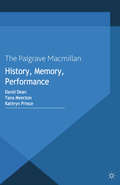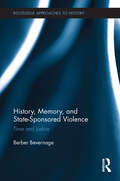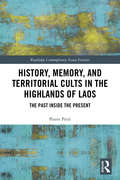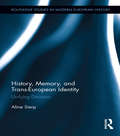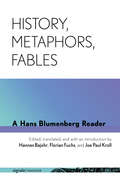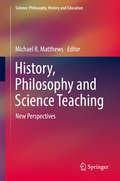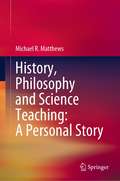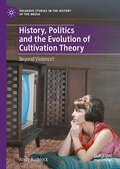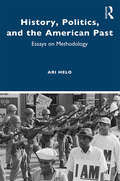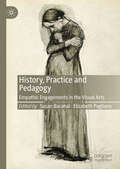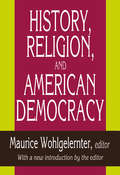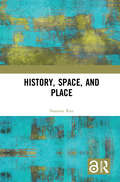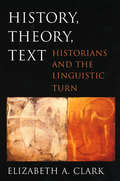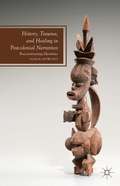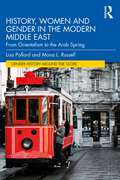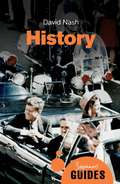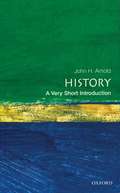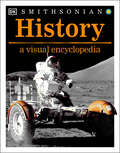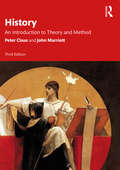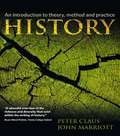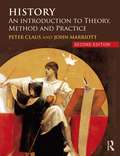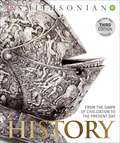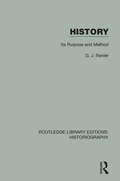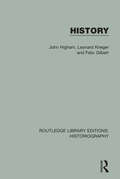- Table View
- List View
History, Memory, Performance
by Kathryn Prince David Dean Yana MeerzonHistory, Memory, Performance is an interdisciplinary collection of essays exploring performances of the past in a wide range of trans-national and historical contexts. At its core are contributions from theatre scholars and public historians discussing how historical meaning is shaped through performance.
History, Memory, and State-Sponsored Violence: Time and Justice (Routledge Approaches to History)
by Berber BevernageModern historiography embraces the notion that time is irreversible, implying that the past should be imagined as something ‘absent’ or ‘distant.’ Victims of historical injustice, however, in contrast, often claim that the past got ‘stuck’ in the present and that it retains a haunting presence. History, Memory, and State-Sponsored Violence is centered around the provocative thesis that the way one deals with historical injustice and the ethics of history is strongly dependent on the way one conceives of historical time; that the concept of time traditionally used by historians is structurally more compatible with the perpetrators’ than the victims’ point of view. Demonstrating that the claim of victims about the continuing presence of the past should be taken seriously, instead of being treated as merely metaphorical, Berber Bevernage argues that a genuine understanding of the ‘irrevocable’ past demands a radical break with modern historical discourse and the concept of time. By embedding a profound philosophical reflection on the themes of historical time and historical discourse in a concrete series of case studies, this project transcends the traditional divide between ‘empirical’ historiography on the one hand and the so called ‘theoretical’ approaches to history on the other. It also breaks with the conventional ‘analytical’ philosophy of history that has been dominant during the last decades, raising a series of long-neglected ‘big questions’ about the historical condition – questions about historical time, the unity of history, and the ontological status of present and past –programmatically pleading for a new historical ethics.
History, Memory, and Territorial Cults in the Highlands of Laos: The Past Inside the Present (Routledge Contemporary Asian Societies)
by Pierre PetitThis book captures the dynamics of history, memory, and territorial cults in Houay Yong, a Tai Vat village situated in the multiethnic highland frontier between Laos and Vietnam. By taking seriously the experiences of the villagers, it partakes in a broader movement to reintegrate highlanders and their agency into history at large. Based on comprehensive fieldwork research and the examination of colonial archives, this book makes accessible, for an English-speaking audience, untapped French archives on Laos and early publications on territorial cults written by French ethnologists. In so doing, it provides a balanced perspective, drawing from the fields of memory studies and classical historical research. Following a chronological approach stretching from the nineteenth century to the present, it extends narrative analysis through a comparative ethnography of territorial cults, a key component of the performative and material presentification of the past. Highly interdisciplinary in nature, History, Memory and Territorial Cults in the Highlands of Laos will be useful to students and scholars of anthropology, history, and religious studies, as well as Asian culture and society.
History, Memory, and Trans-European Identity: Unifying Divisions (Routledge Studies in Modern European History #23)
by Aline SierpThis book questions the presupposition voiced by many historians and political scientists that political experiences in Europe continue to be interpreted in terms of national history, and that a European community of remembrance still does not exist. By tracing the evolution of specific memory cultures in two successor countries of the Fascist/Nazi regime (Italy and Germany) and the impact of structural changes upon them, the book investigates wider democratic processes, particularly concerning the conservation and transmission of values and the definition of identity on different levels. It argues that the creation of a transnational European memory culture does not necessarily imply the erasure of national and local forms of remembrance. It rather means the creation of a further supranational arena where diverging memories can find their expression and can be dealt with in a different way. Through the triangulation of agents of memory construction, constraints and opportunities and actual portrayals of the past, this volume explores the difficulties faced by a multinational entity like the EU in reaching some kind of consensus on such a sensitive subject as history.
History, Metaphors, Fables: A Hans Blumenberg Reader (signale|TRANSFER: German Thought in Translation)
by Hans BlumenbergHistory, Metaphors, and Fables collects the central writings by Hans Blumenberg and covers topics such as on the philosophy of language, metaphor theory, non-conceptuality, aesthetics, politics, and literary studies. This landmark volume demonstrates Blumenberg's intellectual breadth and gives an overview of his thematic and stylistic range over four decades. Blumenberg's early philosophy of technology becomes tangible, as does his critique of linguistic perfectibility and conceptual thought, his theory of history as successive concepts of reality", his anthropology, or his studies of literature. History, Metaphors, Fables allows readers to discover a master thinker whose role in the German intellectual post-war scene can hardly be overestimated.
History, Philosophy and Science Teaching
by Michael R. MatthewsProduced by the Ontario Institute for Studies in Education, this inaugural volume in a new series contains 17 articles (most previously published) by historians, philosophers, psychologists, natural scientists, and science educators who advocate the teaching of science from a broader view in order to improve students' perception of the discipline, increase the development of critical skills, and retain a greater number of students in the field. Annotation copyrighted by Book News, Inc. , Portland, OR
History, Philosophy and Science Teaching: A Personal Story
by Michael R. MatthewsThis book is an historical narrative of academic appointments, significant personal and collaborative research endeavours, and important editorial and institutional engagements. For forty years Michael Matthews has been a prominent international researcher, author, editor and organiser in the field of ‘History, Philosophy and Science Teaching’. He has systematically brought his own discipline training in science, psychology, philosophy of education, and the history and philosophy of science, to bear upon theoretical, curricular and pedagogical issues in science education. The book includes accounts of philosophers who greatly influenced his own thinking and who also were personal friends – Wallis Suchting, Abner Shimony, Robert Cohen, Marx Wartofsky, Israel Scheffler, Michael Martin and Mario Bunge. It advocates the importance of clear writing and avoidance of faddism in both philosophy and in education. It concludes with a proposal for informed and enlightened science teacher education.
History, Politics and the Evolution of Cultivation Theory: Beyond Violence? (Palgrave Studies in the History of the Media)
by Andy RuddockThis book provides a cultural history of cultivation theory, a North American mass communication paradigm best known for arguing that television violence was a potent agent of political socialisation. Decades after its inception, cultivation theory remains an evocative force in imagining twenty-first-century media power. This book reveals how many factors shaped the theory: the spectre of twentieth-century fascism, the Cold War, political turbulence in 1960s America, and the realisation that television had profoundly altered the rhythms of social and political life. The book also explains how cultivation theory became a means of analysing diverse media influences, thanks to various scholars who brought different motivations, perspectives and skills to the project. Cultivation theory succeeded because its practitioners related their work to the changing political moods of post-war America. In doing so, they created a unique critical perspective within mass communication research, which continues to shed light on the role media play in political conflict.
History, Politics, and the American Past: Essays on Methodology
by Ari HeloHistory, Politics, and the American Past assesses the connection between historiography and politics in America on the basis of an important methodological distinction between the past and the history written about it. While necessarily interpreting the past, professional historians and those with a general interest alike remain tempted, consciously or not, to make American history serve their own political and moral views. There is a tendency to impose our present values on the past and sometimes go so far as to believe the past can be changed by present action. In this volume, Ari Helo analyzes examples of this, including metahistorical narratives, presidential speeches, and the occasionally vague rhetoric of the Confederate statue campaigns, before diagnosing the source of doing so and suggesting how we might avoid it. Taking America as its example, the book illuminates essential methodological issues related to history writing while deciphering the complicated relationship of history and politics. The book will be of interest to scholars and students of American history, historiography, American studies, and cultural studies, providing a vivid account of how to make sense of American history.
History, Practice and Pedagogy: Empathic Engagements in the Visual Arts
by Susan Barahal Elizabeth PuglianoThis edited volume explores the historical, practical and pedagogical possibilities for expressing and cultivating empathy through works of art. While aspects of what we today recognize as empathy has nestled in the artistic experiences and philosophies of all ages, the subjective and elusive nature of empathic responses has often resulted in the relegation of empathy to the margins of art historical inquiry. Moving into the second quarter of the twenty-first century, amidst global health crises, civic unrest, political turmoil, and persistent social inequities and injustices, this capacity to feel with and as someone or something outside of ourselves is more critical than ever. Probing the very notion of empathy, contributions address themes ranging from environmental and social justice to identity and inclusion to transdisciplinary pedagogies and practices, each with a critical eye to how works of art not only appeal to empathic sensibilities, but might play an active role in developing capacities for empathy in viewers.
History, Religion, and American Democracy
by Maurice WohlgelernterHistory, Religion, and American Democracy provides a fundamental review of four major themes: naturalism and supernaturalism in an American context; issues in the history of Judaism; American social philosophy; and the teaching and learning of democratic ideals in a pluralistic postmodern environment. This book provides a naturalistic context for the deep analysis of religious, theological, as well as social and political themes.
History, Space and Place
by Susanne RauSpaces, too, have a history. And history always takes place in spaces. But what do historians mean when they use the word "spaces"? And how can spaces be historically investigated? Susanne Rau provides a survey of the history of Western concepts of space, opens up interdisciplinary approaches to the phenomenon of space in fields ranging from physics and geography to philosophy and sociology, and explains how historical spatial analysis can be methodologically and conceptually conceived and carried out in practice. The case studies presented in the book come from the fields of urban history, the history of trade, and global history including the history of cartography, but its analysis is equally relevant to other fields of inquiry. This book offers the first comprehensive introduction to the theory and methodology of historical spatial analysis.
History, Theory, Text: Historians and the Linguistic Turn
by Elizabeth A. ClarkIn this work of sweeping erudition, one of our foremost historians of early Christianity considers a variety of theoretical critiques to examine the problems and opportunities posed by the ways in which history is written. Elizabeth Clark argues forcefully for a renewal of the study of premodern Western history through engagement with the kinds of critical methods that have transformed other humanities disciplines in recent decades. History, Theory, Text provides a user-friendly survey of crucial developments in nineteenth- and twentieth-century debates surrounding history, philosophy, and critical theory. Beginning with the "noble dream" of "history as it really was" in the works of Leopold von Ranke, Clark goes on to review Anglo-American philosophies of history, schools of twentieth-century historiography, structuralism, the debate over narrative history, the changing fate of the history of ideas, and the impact of interpretive anthropology and literary theory on current historical scholarship. In a concluding chapter she offers some practical case studies to illustrate how attending to theoretical considerations can illuminate the study of premodernity. Written with energy and clarity, History, Theory, Text is a clarion call to historians for richer and more imaginative use of contemporary theory.
History, Trauma, and Healing in Postcolonial Narratives: Reconstructing Identities (The Future of Minority Studies)
by Ogaga IfowodoWhat would it mean to read postcolonial writings under the prism of trauma? Ogaga Ifowodo tackles these questions through a psycho-social examination of the lingering impact of imperialist domination, resulting in a refreshing complement to the cultural-materialist studies that dominate the field.
History, Women and Gender in the Modern Middle East: From Orientalism to the Arab Spring
by Lisa Pollard Mona L. RussellThis introductory text explores the gendered history of the modern Middle East, from the eighteenth century to the present, studying the various ways in which gender has defined the region and shaped relations in the modern era. The book captures three aspects of change simultaneously: the events that mark the “modern” Middle East, women’s encounters with the transition to modernity and gendered responses to modernity. It contains both new fieldwork and a synthesis of secondary scholarship that highlight the role of gender in the modernization of Egypt, Turkey, Iran, the Levant and the Persian Gulf states. Chapters are organized chronologically to chart the rapid developments of the modern era, but each chapter also stands on its own, with coverage of masculinity and femininity, sexuality, marriage and the family, labor and women’s contributions to Arab Spring uprisings. Through this comprehensive account, the book pushes back on stereotypes that the Middle East is an ahistorical region and that women have not been vital actors in the process of change. Richly illustrated and accessible for a variety of readers, History, Women and Gender in the Modern Middle East is an ideal resource for undergraduate and postgraduate students in gender studies and Middle Eastern history.
History: A Beginner's Guide (Beginner's Guides)
by David NashWhy study history? What's the point? Through compelling historical narratives, such as the assassination of President Kennedy, Dr. David Nash introduces the central elements of the subject. Readers learn how history seeks to explain, categorize and make sense of events of the past. It is a search for truth which involves searching for sources and then scrutinizing them to try and determine how reliable they are. Nash explores how new interpretations can change our understanding of what was previously an established version of history and what lasting contribution the study of history can make to society and, indeed, civilization.Ideal for those with an emerging interest in history, the book is designed to provide readers with a toolkit for further investigation of the subject.
History: A Novel
by William Weaver Lily Tuck Elsa MoranteHistory was written nearly thirty years after Elsa Morante and Alberto Moravia spent a year in hiding among remote farming villages in the mountains south of Rome. There she witnessed the full impact of the war and first formed the ambition to write an account of what history - the great political events driven by men of power, wealth, and ambition - does when it reaches the realm of ordinary people struggling for life and bread. The central character in this powerful and unforgiving novel is Ida Mancuso, a schoolteacher whose husband has died and whose feckless teenage son treats the war as his playground. A German soldier on his way to North Africa rapes her, falls in love with her, and leaves her pregnant with a boy whose survival becomes Ida's passion. Around these two other characters come and go, each caught up by the war which is like a river in flood. We catch glimpses of bombing raids, street crimes, a cattle car from which human cries emerge, an Italian soldier succumbing to frostbite on the Russian front, the dumb endurance of peasants who have lived their whole lives with nothing and now must get by with less than nothing.
History: A Very Short Introduction
by John H. ArnoldStarting with an examination of how historians work, this "Very Short Introduction" aims to explore history in a general, pithy, and accessible manner, rather than to delve into specific periods.
History: A Visual Encyclopedia (DK Children's Visual Encyclopedias)
by DKThis lavishly illustrated visual encyclopedia tells the story of our world in depth and detail from the dawn of civilization to the present day.Charting human endeavor from every angle, SI History chronicles the significant events, ground-breaking ideas, political forces, and technological advances that have shaped our planet. Every historical episode is explored and explained with the help of stunning images that bring the authoritative text to life. Important points in history, from the battle of Hastings and the storming of the Bastille to D-Day and 9/11, have clear but concise coverage, together with profiles of influential figures, such as Julius Caesar, Cleopatra, and Nelson Mandela. It&’s time to head back in time and explore the past with this striking history book, which features: - Profiles of key people who have made history.- Features on inventions, discoveries, and ideas that changed the world.- Graphics lend immediacy and impact to key statistics.- National Histories section separately chronicles key events of every countryAs each moment in history is defined and detailed, supporting panels note the causes and consequences, providing wider context and broadening our horizons. New and enhanced coverage of recent events – such as the Arab Spring – and contemporary issues such as climate change and the COVID-19 pandemic, bring the book firmly into the present. With its broad-themed approach to important historical events, this book shows that ours is a history with genes and viruses, not just battle and treaties – and the stories and biographies of men and women from every corner of the globe who have shaped today&’s world reaffirm that SI History is the story of humankind in which everyone has a part to play.
History: An Introduction to Theory and Method
by Peter Claus John MarriottThis book provides an accessible introduction to a wide range of concerns that have preoccupied historians over time. Global in scope, it explores historical perspectives not only from historiography itself but from related areas such as literature, sociology, geography and anthropology which have entered into productive dialogues with history. Clearly written and accessible, this third edition is fully revised with an updated structure and new areas of historical enquiry and themes added, including the history of emotions, video history and global pandemics. In all of this, the authors have attempted to think beyond the boundaries of the West and consider varied approaches to history. They do so by engaging with theoretical perspectives and methodologies that have provided the foundation for good historical practice. The authors analyse how historians can improve their skills by learning about the discipline of historiography, that is, how historians go about the task of exploring the past and determining where the line separating history from other disciplines, such as sociology or geography, runs. History: An Introduction to Theory and Method 3ed is an essential resource for students of historical theory and method working at both an introductory and more advanced level.
History: An Introduction to Theory, Method and Practice
by Peter Claus John MarriottWhy should history students care about theory? What relevance does it have to the "proper" role of the historian? Historiography and historical theory are often perceived as complex subjects, which many history students find frustrating and difficult. Philosophical approaches, postmodernism, anthropology, feminism or Marxism can seem arcane and abstract and students often struggle to apply these ideas in practice. Starting from the premise that historical theory and historiography are fascinating and exciting topics to study, Claus and Marriott guide the student through the various historical theories and approaches in a balanced, comprehensive and engaging way. Packed with intriguing anecdotes from all periods of history and supported by primary extracts from original historical writings, History: An Introduction to Theory, Method and Practice is the student-friendly text which demystifies the subject with clarity and verve. Key features - Written in a clear and witty way. Presents a balanced view of the subject, rather than the polemical view of one historian. Comprehensive - covers the whole range of topics taught on historiography and historical theory courses in suitable depth. Full of examples from different historical approaches - from social, cultural and political history to gender, economic and world history Covers a wide chronological breadth of examples from the ancient and medieval worlds to the twentieth century. Shows how students can engage with the theories covered in each chapter and apply them to their own studies via the "In Practice" feature at the end of each chapter. Includes "Discussion Documents" - numerous extracts from the primary historiographical texts for students to read and reflect upon.
History: An Introduction to Theory, Method and Practice
by Peter Claus John MarriottDemystifying the subject with clarity and verve, History: An Introduction to Theory, Method and Practice familiarizes the reader with the varied spectrum of historical approaches in a balanced, comprehensive and engaging manner. Global in scope, and covering a wide range of topics from the ancient and medieval worlds to the twenty-first century, it explores historical perspectives not only from historiography itself, but from related areas such as literature, sociology, geography and anthropology. Clearly written, accessible and student-friendly, this second edition is fully updated throughout to include: An increased spread of case studies from beyond Europe, especially from American and imperial histories. New chapters on important and growing areas of historical inquiry, such as environmental history and digital history Expanded sections on political, cultural and social history More discussion of non-traditional forms of historical representation and knowledge like film, fiction and video games. Accompanied by a new companion website (www.routledge.com/cw/claus) containing valuable supporting material for students and instructors such as discussion questions, further reading and web links, this book is an essential introduction for all students of historical theory and method.
History: From the Dawn of Civilization to the Present Day
by Adam Hart-DavisHistory tells the story of mankind from prehistory to the present day using a unique visual approach, filled with timelines, images of artifacts, photography, graphics, and more. Now in its third edition, this much-loved classic has been revised and updated to bring today's current events into wider context and includes all new material on the global recession, green technologies, and the Internet and social media. <p><p> This fully revised and updated third edition of History includes:<p> • Inventions, discoveries, and ideas that have shaped world history. <br> • A look at human achievement through artifacts, painting, sculpture, and architecture <br> • An examination of humankind in context as part of the natural world. <br> • Eyewitness accounts and biographies of key figures. <br> • A comprehensive timeline chronicling the key events of the countries of the world.<br> • Key contemporary issues, political developments, changes in leadership, and more. <p> Homo sapiens have remained the same species, largely unchanged in genetic makeup and anatomy since the Cro-Magnon era. By contrast, the cultural, social, and technological changes since then have been nothing less than extraordinary. History is a thought-provoking journey, revealing the common threads and forces that have shaped human history.
History: Its Purpose and Method (Routledge Library Editions: Historiography #34)
by G. J. RenierThis treatise of historical methodology, originally published in 1950 is based upon a liberal conception of history which excludes no narrator of past events from the ranks of historians. It defines history as the accurate story which preserves the memory of the past experiences of human societies. The functionof history determines its method and provides the answer to the question: how secure is our knowledge of the past? In the author’s view, history is empirical and its results are for ever provisional. The relative merits of dogmatism and scepticism are examined and several interpretations among English historians are scrutinized.
History: Politics Or Culture? Reflections On Ranke And Burckhardt (Routledge Library Editions: Historiography #1086)
by John Higham Leonard Krieger Felix GilbertThis book, originally published in 1977, is a survey of European historiography from its origins in the historians of Greece and Rome, through the annalists and chroniclers of the middle ages, to the historians of the late eighteenth century. The author concentrates on those writers whose works fit into a specific category of writing, or who have inlfuence the course of later historical writing, though he does deal with some of the more specialist forms of medieval historiography such as the crusading writers, and chivalrous historians like Froissart. He maintains that ‘modern’ history did not develop until the 18th Century.
